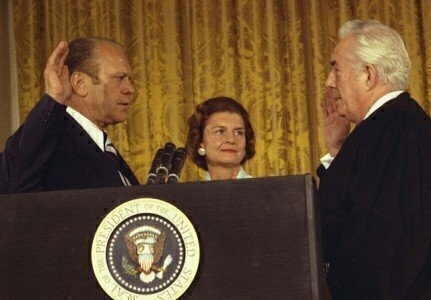Today is the birthday of the late former President, Gerald R. Ford, who went from being a college football star to the White House under the most unusual circumstances.
 Ford took the oath of office on August 9, 1974, after Richard Nixon’s resignation amid the Watergate scandal. Ford became the first, and so far the only, person to become President without winning a general election for President or Vice President.
Ford took the oath of office on August 9, 1974, after Richard Nixon’s resignation amid the Watergate scandal. Ford became the first, and so far the only, person to become President without winning a general election for President or Vice President.
The 25th Amendment to the Constitution allowed Ford to assume the presidency after he was selected by Nixon to replace Spiro Agnew, the Vice President elected on the 1972 Republican ticket who resigned in an unrelated scandal.
Section 2 of the 25th Amendment gives the President the power to name a new Vice President, if that office became vacant, with the permission of Congress.
Nixon nominated Ford, who was the House minority leader, to take Agnew's position on October 12, 1973. The Senate voted 92 to 3 to confirm Ford on November 27, 1973, and on December 6, 1973, the House confirmed him by a vote of 387 to 35.
Before Nevada acted as the 38th state to ratify the 25th Amendment in February 1967, a different line of presidential succession existed. Speaker of the House Carl Albert, a Democrat, would have served as acting President if Nixon had resigned without the 25th Amendment’s conditions being in effect.
Instead, Ford made the transition to the presidency in 1974, with Albert as second-in-line to the White House for a brief period until Congress approved Nelson Rockefeller as Ford’s Vice President.
Ford quickly acknowledged the situation after taking an oath administered by Chief Justice Warren Burger.
“The oath that I have taken is the same oath that was taken by George Washington and by every President under the Constitution. But I assume the Presidency under extraordinary circumstances never before experienced by Americans. This is an hour of history that troubles our minds and hurts our hearts,” Ford told a national audience. “My fellow Americans, our long national nightmare is over. Our Constitution works; our great Republic is a government of laws and not of men. Here the people rule.”
Ford’s path to the White House was unique for other reasons. Born Leslie Lynch King, Jr., on July 14, 1913, his name was changed to Gerald Rudolph Ford, Jr. after his mother re-married.
He graduated from Grand Rapids South High School in Michigan and was a star football player at the University of Michigan. Ford earned a degree from Yale Law School before serving in the U.S. Navy in World War II.
Ford later served in the U.S. House of Representatives for 25 years, and he was a member of the Warren Commission that investigated President John F. Kennedy’s assassination. Ford also served as House minority leader for eight years before becoming Vice President.
As the 38th President, Ford served 895 days in office, the fifth-shortest length of any President. After leaving the White House after losing an election bid in 1976 to Democrat Jimmy Carter, Ford was seen as a contender for the 1980 nomination, but he declined to run against Ronald Reagan for the GOP nomination.
Former President Ford had a distinguished career outside politics in his remaining years, and he died on December 26, 2006, in California. He was also the longest-lived President, being 45 days older than Reagan.
Ford also died on the 34th anniversary of the passing of former President Harry Truman. Two other sets of Presidents died on the same day: James Monroe, John Adams, and Thomas Jefferson on July 4, and Millard Fillmore and William Howard Taft on March 8.






